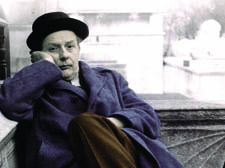
Sir John Betjeman |
Sir John found poetry in the ordinarines
Sir John Betjeman's biographer A N Wilson describes a north London boy who never forgot who he was and found beauty in the everyday
John Betjeman is our local poet. He was born in a block of flats in Gospel Oak. He spent his formative years at 31, West Hill, Highgate, and many of his best poems of place are about north London. I think of that wonderful evocation of the tram-ride which he took as a child through Kentish Town, arriving at Highgate Ponds. Years later, he wrote to a member of the Camden History Society: “The tram was a number 7 and it was brown when it was LCC”. In this long letter, the 65-year-old poet itemized every detail which he had brought into the poem, and more.
“There was a cinema higher up on the same side and there I saw my first film. The Bon Marché was an old fashioned draper’s shop”, and so on and so on. It is clear when you read this letter that all the details remained in his head. He did not have to look things up in books.
His poetry grew out of this eye and ear for small details – shop names, street names, plant names. “Soft the light suburban evening caught our ashlar-speckled spire,/Eighteen-sixty Early English, as the mighty elms retire/Either side of Brookfield Mansions flashing fine French-window-fire.”
Those lines, which make poetry of noticing how the evening light flashes on windows in a block of flats, also shows the future film documentary-maker’s eye.
On August 28 we shall be celebrating the 100th anniversary of the birth of John Betjeman, north Londoner extraordinaire.
He was the son of an Islington manufacturer, who was born into “trade”. His father Ernest, like many business-men and tradesfolk of the time, educated his boy as a “gentleman”, and then was surprised when his son turned out to have adopted some of the snobbish values of the very boarding schools that poor Ernest had himself carefully selected.
“Yes I’m in trade and proud of it I am”, Betjeman quotes his father as saying during one of their rows. He has his Dad calling him a “filthy low-down sneaking little snob”. But if a snob is someone who looks down on their own origins, or who pretends to be something they aren’t, then Betjeman wasn’t a snob. He moved in a circle which included aristocrats and bohemians, and for the second half of his life, his girlfriend, Elizabeth Cavendish, was a duke’s daughter. But Betjeman never pretended to be anything other than what he was, a boy from north London who had been given by what he called The Management the gift of poetry.
On his first date with Elizabeth, incidentally, he took her not to the Ritz or the Savoy. He took her to Willesden to look at the soot-infested graveyard, overlooked by a chemical factory. (He loved Willesden, and the medieval shrine of the Black Madonna).
Whether remembering the great polychromatic brickwork of Saint Saviour’s Church, Aberdeen Park, where his parents were married, or recalling boyhood walks on Hampstead Heath, Betjeman remained true to his north London roots.
And who can ever forget one of his most sympathetic poems, ‘Business Girls’. “From the geyser ventilators/Autumn winds are blowing down/On a thousand business women/Having baths in Camden Town.”?
Betjeman genuinely liked, and was interested in, other people. He was not mocking the secretaries who rush from their cheap lodgings in Camden for the “tiny breakfast/Trolley bus and windy street”.
He was perhaps the first writer in the English language who saw that such people’s lives had just as much potential for poetry as did anyone else.
He was a true romantic, who found poetry on the red electric train running into Ruislip just as much as in the grassy hillocks of the Heath or the tramride from which he saw “children carrying down/ Sheaves of dandelions to the courts of Kentish Town”.
There are many Betjeman celebrations planned to coincide with his centenary, including a gala variety show compered by Dame Edna Everidge, special trains to Metroland and a huge party near the Cornish village where he died.
But the best memorial to Betjeman that exists is the fact that wherever you go in London, as in other parts of the country, you are reminded of one of his poems, and this is especially true of our part of town.
CLICK BELOW TO SERACH FOR ACCOMODATION
|